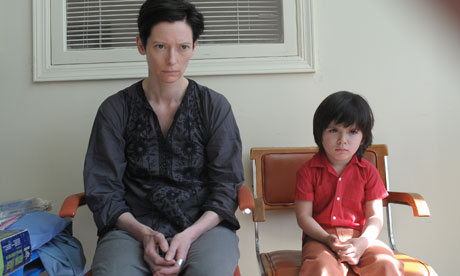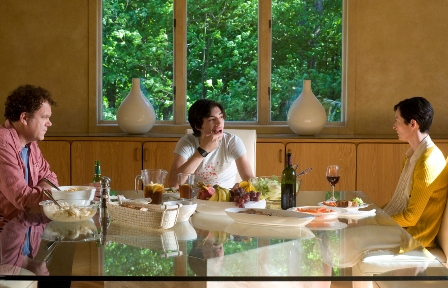LFF review: We Need to Talk about Kevin

Warning: spoilers (as far as I can spoil the plot of a very famous 8-year-old book for you)
Ah. "We need to talk about Kevin." The words that the eponymous Kevin (Ezra Miller/Jasper Newell/ Rocky Duer)'s mother Eva (Tilda Swinton) never manages to say to her sweet, blinkered husband Franklin (John C Reilly).
Lynne Ramsay's fine adaptation of the very unloveable 2003 novel dispenses with the epistolary form of the original, and is instead structured around Eva's life post-massacre, with flashes of the past forcing continually pushing to the surface. Kevin's actions have defined her current situation; the film shows us how.
Eva Khatchadourian is living a hellish life in which people come up to her and insult her, spit at her or slap her in the street. Most days, she cleans off red paint splattered over the front of the house she curiously lives in alone. No one is very keen to employ her.
How did it come to this? The opening scene sets the colour theme for the movie - red - and is the only time that we see a smiling Eva. She is surrounded by people and bathed in red liquid - not blood, but squashed tomatoes, as she is attending the La Tomatina festival in Spain as part of her work as a travel writer.

She once enjoyed her freedom and her ability to escape round the world. We're not shown how she meets her husband Franklin, or why she marries him, but it is clear that she has settled for, rather than into, suburban family life.
Like the book, the film cannot decide for us whether Kevin was born a monster, or whether Eva's treatment of him made him one. The answer is likely to be a little from column A, a little from column B.
Even from a young age, Kevin is eerily good at coldly disobeying Eva, while acting like a ray of sunshine the moment his father walks through the door. For instance, while still a toddler, Kevin sprays paint all over a room carefully wallpapered in antique maps by his mother. She said that she had made it "special;" he later tells his father that he was trying to help make it "special." Are those creepily knowing looks from a tiny boy how things actually were, or how Eva remembers it?

And so the splashes of red all over the film gradually take on a more sinister appearance as we learn more about the mass murder Kevin committed in the gym at his school, days before his 16th birthday. The instances of red are symbolic of the fact that this is very much Eva's re-interpretation of her memories, her attempt to answer the question of what made him do it, and whether or not she should have seen disaster coming.
Did her possible post-natal depression drive a wedge between them? Was he just born with sociopathic tendencies? Kevin's much younger sister, Celia, is, in contrast, a very sweet and gentle child; Eva also seems much more capable of mothering her. Is that just down to timing?
Essentially, neither Kevin nor Eva are completely believeable characters, but that is the fault of the source material. We Need to Talk About Kevin works best on the level of philosophy - what makes us, nature or nurture - than in terms of character development. On paper, Kevin is too horror-movie devil-child, Eva is, at times, too shockingly unmotherly, while Franklin is just blithely blind to it all.
Having said that, the lead performances in the film are impressive, particularly Tilda Swinton's. She lends Eva a vulnerability that is missing in the book, and makes us care for her all the more.

The real power of the story lies in its examination of the aftermath. When a boy in a wheelchair comes up to Eva, we expect a verbal lashing. Instead, this boy – who was paralysed by Kevin during his rampage – asks Eva how she is doing. It is an unforgettably tender moment in a film overflowing with hissed insults and out-and-out hostility. How does it feel to be her? She now occupies a unique, and terrible, space in the imaginations of those around her. She is intensely alone now, but not free, as she was before motherhood.
The last scene shows Eva hugging Kevin in his orange prison jumpsuit. He clearly really needs it. Whether the community she lives in can ever forgive her for her transgressions, real or imagined (was it her nurture or her nature or neither?), is unlikely. And that is, finally, where the audience finds their well of sympathy for Eva.
The London Film Festival is running 12-27 October 2011. For more information, please go to http://www.bfi.org.uk/lff/
suchandrika.wordpress.com